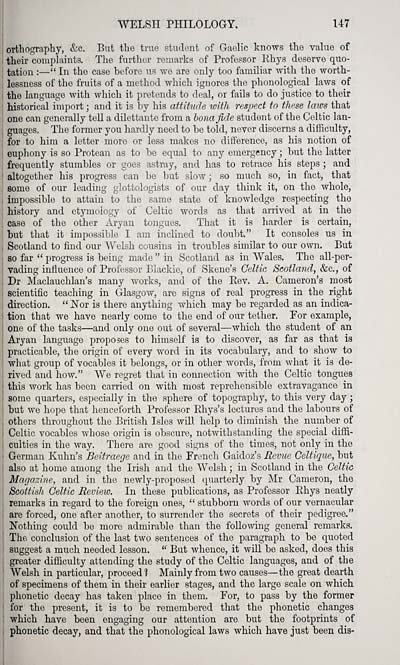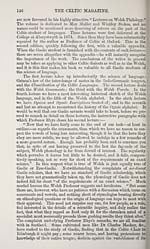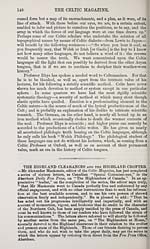Blair Collection > Celtic magazine > Volume 5
(157)
Download files
Complete book:
Individual page:
Thumbnail gallery: Grid view | List view

I WELSH PHILOLOGY, U7
I orthography, &c. But the true student of Gaelic knows the value of
! their complaints. The further remarks of Professor Rhys deserve quo-
. tation : — " In the case before us wo are only too familiar with the worth-
lessuess of the fruits of a method which ignores the phonological laws of
the language with which it pretends to deal, or fails to do justice to their
historical import ; and it is by his attitude with resided to these laios that
one can generally teU a dilettante from a bona fide student of the Celtic lan-
guages. The former you hardly need to be told, never discerns a difficulty,
, for to him a letter more or less makes no difference, as his notion of
, euphony is so Protean as to be equal to any emergency ; but the latter
, frequently stumbles or goes astray, and lias to retrace his steps ; and
' altogether his progress can be but slow; so much so, in fact, that
some of our leading glottologists of our day think it, on the whole,
I impossible to attain to the same state of knowledge respecting the
; history and etymology of Celtic words as that arrived at in the
; case of the other Aryan tongues. That it is harder is certain,
but that it impossible I am inclined to doubt." It consoles us in
; Scotland to find our Welsh cousins in troubles similar to our own. But
1 so far " progress is being made " in Scotland as in Wales. The all-per-
i vading influence of Professor Blackie, of Skene's Celtic Scotland, &c., of
\ Dr Maclauchlan's many works, and of the Eev. A. Cameron's most
I scientific teaching in Glasgow, are signs of real progress in the right
i direction. " Nor is there anything which may be regarded as an indica-
I tion that we have nearly come to the end of our tether. For example,
j one of the tasks — and only one out of several — which the student of an
} Aryan language proposes to himself is to discover, as far as that is
i practicable, the origin of every word in its vocabulary, and to show to
: what group of vocables it belongs, or in other words, from what it is de-
\ rived and how." We regret that in connection with the Celtic tongues
j this work has been carried on with most reprehensible extravagance in
S some quarters, especially in the sphere of topography, to this very day ;
I but we hope that henceforth Professor Ehys's lectures and the labours of
I others throughout the British Isles will help to diminish the number of
I Celtic vocables whose origin is obscure, notwithstanding the special diffi-
! culties in the way. There are good signs of the times, not only in the
I German Kuhn's Beitraege and in the French Gaidoz's Revue Celtique, but
j also at home among the Irish and the Welsh ; in Scotland in the Celtic
Magazine, and in the newly-proposed quarterly by Mr Cameron, the
Scottish Celtic Review. In these publications, as Professor Ehys neatly
remarks in regard to the foreign ones, " stubborn words of our vernacular
i are forced, one after another, to surrender the secrets of their pedigree."
Nothing could be more admirable than the following general remarks.
1 The conclusion of the last two sentences of the paragraph to be quoted
\ suggest a much needed lesson. " But whence, it will be asked, does this
greater difficulty attending the study of the Celtic languages, and of the
' Welsh in particular, proceed? Mainly from two causes — the great dearth
of specimens of them in their earlier stages, and the large scale on which
I phonetic decay has taken place in them. For, to pass by the former
I for the present, it is to be remembered that the phonetic changes
' which have been engaging our attention are but the footprints of
, phonetic decay, and that the phonological laws which have just been dis-
I orthography, &c. But the true student of Gaelic knows the value of
! their complaints. The further remarks of Professor Rhys deserve quo-
. tation : — " In the case before us wo are only too familiar with the worth-
lessuess of the fruits of a method which ignores the phonological laws of
the language with which it pretends to deal, or fails to do justice to their
historical import ; and it is by his attitude with resided to these laios that
one can generally teU a dilettante from a bona fide student of the Celtic lan-
guages. The former you hardly need to be told, never discerns a difficulty,
, for to him a letter more or less makes no difference, as his notion of
, euphony is so Protean as to be equal to any emergency ; but the latter
, frequently stumbles or goes astray, and lias to retrace his steps ; and
' altogether his progress can be but slow; so much so, in fact, that
some of our leading glottologists of our day think it, on the whole,
I impossible to attain to the same state of knowledge respecting the
; history and etymology of Celtic words as that arrived at in the
; case of the other Aryan tongues. That it is harder is certain,
but that it impossible I am inclined to doubt." It consoles us in
; Scotland to find our Welsh cousins in troubles similar to our own. But
1 so far " progress is being made " in Scotland as in Wales. The all-per-
i vading influence of Professor Blackie, of Skene's Celtic Scotland, &c., of
\ Dr Maclauchlan's many works, and of the Eev. A. Cameron's most
I scientific teaching in Glasgow, are signs of real progress in the right
i direction. " Nor is there anything which may be regarded as an indica-
I tion that we have nearly come to the end of our tether. For example,
j one of the tasks — and only one out of several — which the student of an
} Aryan language proposes to himself is to discover, as far as that is
i practicable, the origin of every word in its vocabulary, and to show to
: what group of vocables it belongs, or in other words, from what it is de-
\ rived and how." We regret that in connection with the Celtic tongues
j this work has been carried on with most reprehensible extravagance in
S some quarters, especially in the sphere of topography, to this very day ;
I but we hope that henceforth Professor Ehys's lectures and the labours of
I others throughout the British Isles will help to diminish the number of
I Celtic vocables whose origin is obscure, notwithstanding the special diffi-
! culties in the way. There are good signs of the times, not only in the
I German Kuhn's Beitraege and in the French Gaidoz's Revue Celtique, but
j also at home among the Irish and the Welsh ; in Scotland in the Celtic
Magazine, and in the newly-proposed quarterly by Mr Cameron, the
Scottish Celtic Review. In these publications, as Professor Ehys neatly
remarks in regard to the foreign ones, " stubborn words of our vernacular
i are forced, one after another, to surrender the secrets of their pedigree."
Nothing could be more admirable than the following general remarks.
1 The conclusion of the last two sentences of the paragraph to be quoted
\ suggest a much needed lesson. " But whence, it will be asked, does this
greater difficulty attending the study of the Celtic languages, and of the
' Welsh in particular, proceed? Mainly from two causes — the great dearth
of specimens of them in their earlier stages, and the large scale on which
I phonetic decay has taken place in them. For, to pass by the former
I for the present, it is to be remembered that the phonetic changes
' which have been engaging our attention are but the footprints of
, phonetic decay, and that the phonological laws which have just been dis-
Set display mode to: Large image | Transcription
Images and transcriptions on this page, including medium image downloads, may be used under the Creative Commons Attribution 4.0 International Licence unless otherwise stated. ![]()
| Early Gaelic Book Collections > Blair Collection > Celtic magazine > Volume 5 > (157) |
|---|
| Permanent URL | https://digital.nls.uk/76450779 |
|---|
| Description | Volume V, 1880. |
|---|---|
| Shelfmark | Blair.6 |
| Attribution and copyright: |
|
| Description | A selection of books from a collection of more than 500 titles, mostly on religious and literary topics. Also includes some material dealing with other Celtic languages and societies. Collection created towards the end of the 19th century by Lady Evelyn Stewart Murray. |
|---|
| Description | Selected items from five 'Special and Named Printed Collections'. Includes books in Gaelic and other Celtic languages, works about the Gaels, their languages, literature, culture and history. |
|---|

